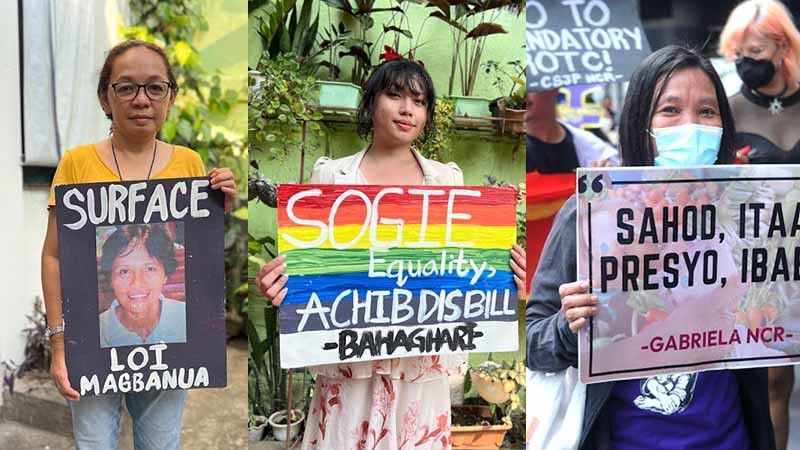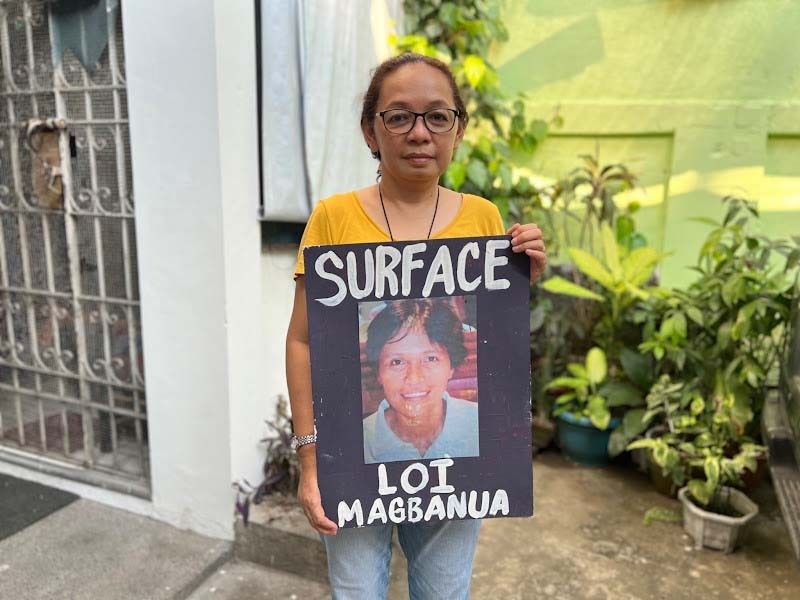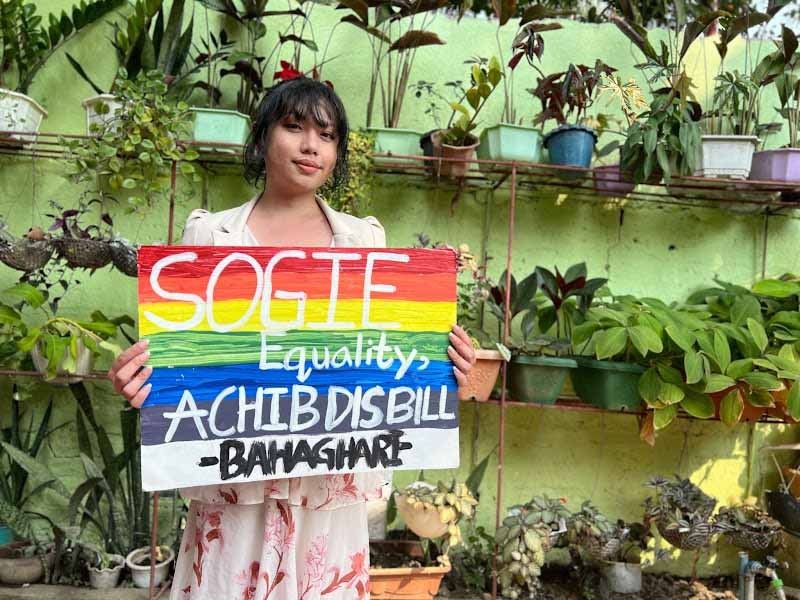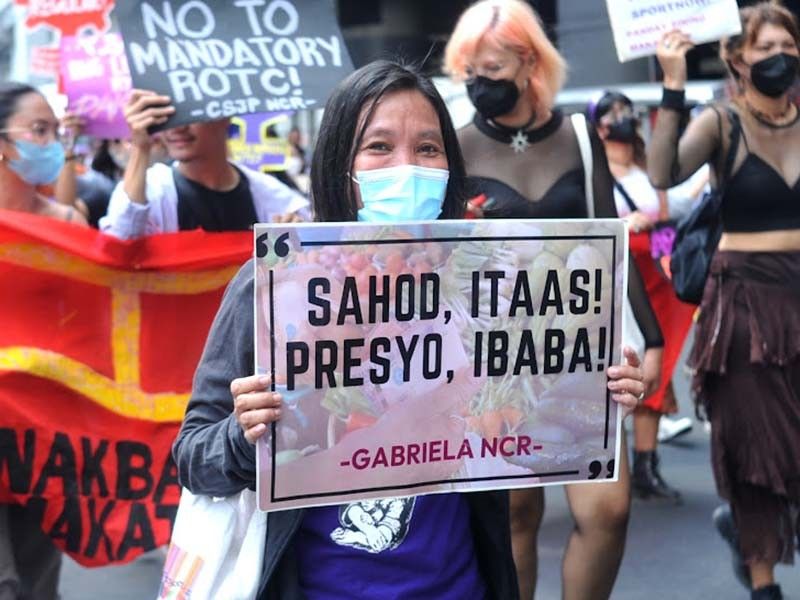Women human rights defenders: Defiant, hopeful, sure of their place in struggle

This story was made possible through a grant from Oxfam Pilipinas
MANILA, Philippines — "A woman’s place is in the struggle."
This quote, written in countless placards carried by generations of women's rights activists in the Philippines since the 1970s, was actually first made famous by the Black American activist Assata Shakur. Still, it perfectly captures the image of Filipino women unencumbered by traditional roles and expectations, taking on leadership roles in the defense of human rights and dignity, and fighting for social change.
These three women human rights defenders perfectly personify the quote. In this age of mass disinformation and authoritarianism, Ruth Manglalan, Reyna Valmores and Letty Castillo represent different generations of women on the march: defiant in the face of attacks, but hopeful and working hard for a better, more humane society.
Here are their stories of defiance and hope.
Ruth Manglalan

Like many people at that time, Ruth Manglalan was caught up in the turmoil of the aftermath of the assassination of Sen. Benigno Aquino Jr. in 1983.
"I remember the date: December 3, 1984. It was the first protest rally that I attended, when Gen. Fabian Ver was acquitted for the charge of masterminding the Aquino assassination. It was just a snake rally inside the Arts and Sciences (AS) building," she recalled. "But it was a time of heightened political activity among students, but also among Filipinos in general."
She quickly became an activist, joining a volunteer group called People’s Service Corps. Ruth joined immersion activities among striking workers and dispossessed farmers, and helped bring them to the campus to drum up support from students.
"After leaving the university, a friend who worked with (women’s rights activist) Nelia Sancho in the Asian Human Rights Council recruited me. But Nelia was also executive-director of Gabriela – Commission on Children and Family, whose office was in Malate, near where I lived. So I chose to work with Nelia in Gabriela," Ruth added.
In Gabriela, Ruth learned of the intricacies of women and children's issues and struggles, from rescuing and helping domestic abuse survivors to organizing women workers in the workplace. She later worked as a public information officer of the women's group. Gradually, Ruth began to gravitate towards organizing women workers and urban poor women.
In 2003, she became part of the support group for the SM workers' strike. A great majority of SM workers were women, specifically sales ladies and cashiers who endured difficult work conditions for low pay.
After that, in 2004, Ruth helped organize chapters for the newly-established Gabriela Women's Party-list in Taguig City. In one of those campaign sorties, she met and got close to Elizabeth "Loi" Magbanua, a former worker who became a full-time organizer of women workers in that city. They soon became a couple.
Ruth and Loi later worked together as organizers of "kananayan" (mothers) in Tondo, Manila. Along Estero de Vitas were old, dilapidated public housing projects that had been targeted for demolition. It was also located near the former Smokey Mountain dumpsite.
Thousands of women and men, many of whom were landless farmers from provinces who longed for better lives in Manila, migrated and lived in those worn-down housing buildings in Tondo. Ruth and Loi would be mainstay organizers there, doing education campaigns among the mothers, helping implement various welfare projects from rescue programs of victims of domestic abuse to activities to address health problems of women and children to "know-your-rights" seminars for formal and informal workers living in Vitas.
"One of the most unforgettable cases for me was that of a minor whom we rescued from her stepfather who was raping her. The mother was afraid of what her partner, the child’s stepfather, might do to both of them. So, Gabriela, with the help of barangay officials, intervened to remove the child from the stepfather’s house and later file a case against the stepfather," Ruth recounted.
She and Loi ended up doing comprehensive organizing work for 10 years in Tondo, from 2012 to 2022.
Last year, days before the national elections, Loi and Alipio "Ador" Juat, a fellow labor rights advocate, were on their way home from a meeting when armed men accosted them and put them in separate vehicles. They were eventually brought to the Armed Forces of the Philippines' headquarters in Camp Aguinaldo. Ador was allowed to contact his family, with the caveat that they do not get in touch with "human rights groups" to "ensure Ador’s safety".
Both have been held incommunicado ever since, and are considered "desaparecidos" or victims of involuntary disappearance.
Ruth came to know about Loi's abduction a few days after. She sought the help of Gabriela, who mounted a public information campaign for Loi and Ador's surfacing. They brought the case to the attention of the Commission on Human Rights.
In September 2022, the Court of Appeals issued a writ of amparo, holding the military accountable for Loi and Ador’s disappearance. The military has yet to allow Ruth and Gabriela to search the camps.
"There are days when I feel hopeful that I will see Loi again someday. But there are days when I feel resigned to the possibility that I have lost her forever," Ruth said. "It's very difficult. I lost a partner, not just in life, but in struggle. She is my rock, my confidant, my sounding board. I lost a great part of my life. The government took that away from me."
RELATED: CA orders military: Locate 2 missing activists
Reyna Valmores

While Ruth has been in the struggle for women's rights for decades, Reyna Valmores is a relative newcomer. But in the short time that she got involved with the struggle, Reyna has shown herself to be a quick learner.
"I came from Tacloban in Leyte. Growing up, it was a very conservative place. We were taught that it was a sin being a bading (homosexual) or an LGBTQIA+. At home, everytime I showed effeminate acts, my father would beat me up with his leather belt," she said.
Reyna was born male, though early in life she already felt and knew that she was a girl. But her father, who was — and still is — a local politician in Leyte would have none of it. He would also be physically abusive towards his wife, Reyna's mother.
In school, Reyna dreaded showing her true self, to the point that she would dread recitations or any activity that would draw attention to herself. She would have constant stage fright. "I felt that if I speak in an effeminate way, the teacher would tell on me to my father. And I would be beaten at home," she said.
In 2013, Tacloban was devastated by Typhoon Yolanda. It just so happened that like many upper middle-class families, they lived in an elevated area of the city. Reyna and her family were spared from tragedy, but some of her classmates and friends died in the storm surge.
"So we transferred to Metro Manila. I finished my high school at Philippine Science High School. Then, I studied at the University of the Philippines in Diliman," Reyna added.
Because she excelled in academic work, Reyna took up a molecular biology and biotechnology course, one of the most academically difficult and demanding in UP Diliman.
"It was during this time that my mother confessed to me that my father had been beating her up. He was also a serial cheater, and contracted a sexually transmissible disease (STD) that he eventually passed on to my mother. Because of the STD, she was unable to bear another child," Reyna recalled.
"Her illness progressed to the point that there were malignancies already in her cervix that could develop to become cancerous. So I decided to study molecular biology because I wanted to find a cure for cancer," she added.
In college, Reyna had yet to come out of the closet. But it was the time that she felt that something was amiss. "I had an undiagnosed mental condition. I was doing self-harm," she said. When she began to address her own mental health and confront her own sexuality, Reyna began doing well in school.
"Right after graduation, a friend invited me to join Bahaghari, a progressive organization of LGBTQIA+ advocates. I was already out of the closet then. I did not know much, then, but I already said to myself and to people that I was a woman," she said.
"June 2019, one year after I graduated, I joined my first activity – the Pride March. It was there that it dawned on me that we have a violent culture that is very harsh on women and, by extension, the LGBTQIA+ community. And that violence exists primarily on the economic plane, in workplaces and communities," Reyna added.
It all happened so fast for her – attending forums, educational discussions, meetings. In a few months, she had become well-versed on the issues confronting the LGBTQIA+ community, and its intersections with other social issues. Reyna was in a frenzy to study, this time a different time of malady: social cancer.
"As a scientist, I felt the effect of the country’s lack of basic industries. Many of my fellow scientists are compelled to work abroad because of the lack of scientific infrastructure and lack of national industries in the country," she said.
In fact, before the pandemic happened in 2020, Reyna was set to study in the United States for her PhD. But she decided to stay in Manila to become a full-time organizer for Bahaghari.
"What convinced me to become a full-time activist was my personal experience of being abused as a child, bullied at school, belittled by people even though I knew what I was capable of," Reyna said. Bahaghari gave her the space and opportunity to understand her experiences in the context of the broad social realities. And she wanted to help others who may be in similar situations.
Since then, Reyna has lost no time spreading her activist wings. As Bahaghari chairperson, she has been active in helping organize chapters in schools and communities, speaking in public forums, participating in broad protest actions outside her main advocacy, lobbying against the revival of mandatory Reserve Officers Training Corps and for the passage of the Sexual Orientation and Gender Identity Expression (SOGIE) Equality Bill.
In lobbying for the SOGIE Bill, Reyna said she saw for herself how conservative forces inside government continue to impede change. "That the SOGIE Bill has been pending for two decades now is a symptom of many administrations' lack of priority for LGBTQIA+ rights," she added.
Reyna also came under the crosshairs of religious and conservative politicians like Rep. Eddie Villanueva (CIBAC party-list) as well as the controversial televangelist Pastor Apollo Quiboloy.
In November, Quiboloy red-tagged Reyna on his station, unleashing a storm of trolls on social media. But Reyna withstood the attacks. Despite the trolls, she continues to be active on Twitter, garnering hundreds of engagements every post.
"What we need now for the LGBTQIA+ community is to unite, and sum up the situation of our members, in different sectors and classes, in order to come up with a more solid and stronger movement," Reyna added.
Though only 25, Reyna has shown that she can learn on the fly, and learn to lead.
RELATED: Villanuevas in Congress move to delay SOGIE Equality Bill
Letty Castillo

Like Reyna, Letty Castillo did not become involved in advocacy work until after graduation from college.
"That was 1998, straight out of college, I worked in an assembly line of automobiles in an export processing zone in Cavite," Letty recounted. "But the management forced us to take a leave of absence after its sister company in Korea was shut down."
She then worked as a sales clerk for a large shopping mall. "I was walking in the mall when I encountered an old friend. She said she was working for [Ecumenical Institute for Labor Education and Research]. She invited me to volunteer," she added.
Curious, she agreed to go with her friend. Letty attended labor advocacy discussions, and even visited picket lines of striking workers, like the one at the Manila Hotel in 1999 and the Grand Boulevard Hotel in 2000.
"I was not very much involved back then. But when police broke off the workers' picket line in Manila Hotel, I was among those arrested. Also arrested were Ka Bel and Fr. Joe," Letty said. She was referring to revered labor leader Crispin "Ka Bel" Beltran of Kilusang Mayo Uno and labor rights advocate Fr. Joe Dizon.
She became more involved with labor rights advocacy after the arrest. In 2001, though, reality struck hard. To support her family's needs, she had to find work. She found one — as an overseas Filipino worker (OFW) in South Korea. She worked in a factory and met her future husband, a fellow OFW, there.
In South Korea, Letty later became involved with Migrante-South Korea, helping out compatriots who were undocumented, had problems with the country’s Employment Permit System, or were abused by their Korean partners.
"We got in touch with our kababayans who were married to abusive Korean partners. Their marriages were not working, their husbands were beating them up, so we helped them get out of those relationships," Letty explained.
She ended up staying in South Korea for eight years. Letty and her husband had two kids. In 2009, the Korean government cracked down on undocumented workers, and her husband was among those deported.
"Our kids followed him home to the Philippines. For two months, I stayed behind. After all, I had a work visa. But my husband, who worked for 17 years in Korea, did not know how to take care of our children. Plus, I missed them so much. So I followed them home," Letty said.
Back in Manila, Letty accepted work as a daycare worker for Caritas Manila in 2009. She did that for five years, before once again heeding the call for community service in 2014. She was with Akap-Bata Party-list, and they founded a daycare center in Valenzuela.
By 2016, she moved on to organize urban poor women and women workers in Valenzuela. Letty became chairperson of Gabriela-Valenzuela and vice-chairperson of Gabriela-National Capital Region. As a community leader, she organized women and men in Barangay Bignay in Valenzuela to resist demolition of their homes.
Today, Letty continues her work as a woman and labor leader, helping out workers in Valenzuela organize themselves into unions or associations to assert their rights.
"They face the same problems workers all across the country face: low wages, bad working conditions, repression of their rights. During the pandemic, we organized workers in different factories of plastic in Valenzuela to form Samahan ng mga Manggagawa sa Valenzuela," Letty said.
Because of this, she earned the ire of the Joint Task Force for National Capital Region of the National Task Force to End Local Communist Armed Conflict (NTF-ELCAC). "In 2020, we picketed a factory of Alcophil, a company that produces aluminum products in Valenzuela. The very next day, NTF-ELCAC began putting up tarpaulins and posters all over Valenzuela, with the names and pictures of seven organizers for SMV, including me. They called us ‘CPP-NPA-NDF members’. All because we helped workers fight for their rights," Letty added.
"I have been an activist for 23 years. This was the first time I have been harassed like this. Strangers now routinely follow me wherever I go. They stand in front of our house for hours. They do not approach me. But they ask my neighbors about me – what time I leave the house, where I usually go. In NTF-ELCAC's seminars in Valenzuela, their presentations usually include images of my social media accounts," she said.
Letty said their organization is now doing what it can to sound the alarm. They brought the issue to the Commission on Human Rights, as well as to the local government, and are exploring other legal remedies to stop the harassment.
Her family worries about Letty. "They ask, ‘What if they come into our house and take you? What if they ‘plant’ firearms and grenades in our home? We don’t even have enough money for food, how can we afford guns and grenades?'" she said.
Whatever happens, Letty said, they will be ready to defend their rights and insist that fighting for women and workers is not a crime but a noble service.
RELATED: Dealing with ‘double burden’: The guilt migrant domestic workers carry
- Latest


























